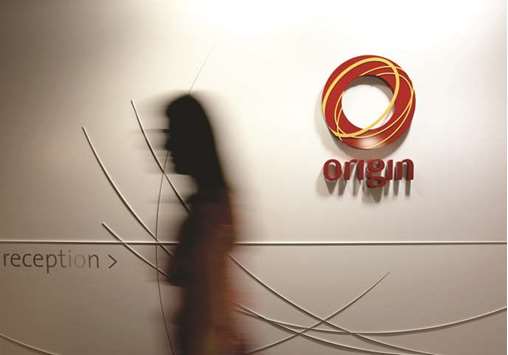After amassing $1.2bn in write-downs on its first liquefied natural gas project, Origin Energy Ltd is looking to the US shale revolution for answers.
The operator of the A$25.9bn ($20.3bn) Australia Pacific LNG facility, has sent executives to the US to study and replicate the shale sector’s ability there to thrive even as oil struggles to top $50 a barrel, chief executive officer Frank Calabria said in a phone interview yesterday. Origin plans to roll out a leaner operating model for the APLNG facility and improve the results from each of its unconventional gas wells, it said in a statement.
“We have looked quite extensively at what is going on in an industry that is rapidly advancing over there,” Calabria said. After investing “a lot of capital” on APLNG and lowering its long-run oil price forecast to $67 a barrel last week, the company is focused on replicating the lead of US unconventional producers who have reduced costs and improved productivity. ConocoPhillips and Sinopec also hold stakes in the APLNG plant.
Origin is among companies including Santos Ltd that have slashed the value of LNG export facilities in Queensland state that cost more than A$70bn to build amid sluggish oil prices. Drillers in the US have become leaner the last few years with oil trading at just half its price in 2014. Appalachian producers in the US can now break even at less than $3 a million British thermal units, a 15% improvement from a year earlier, according to WTRG Economics.
The hefty cost of constructing APLNG has piled pressure on Origin, driving debt levels above A$12bn in 2015. As part of the write-downs announced last week, it took a A$815mn charge on its 37.5% stake in APLNG after cutting its oil price assumptions for the venture. That followed a A$1.03bn charge on APLNG earlier this year. Full-year production at APLNG climbed 40% year-on-year as the second train started, the company said last month.
APLNG is one of three Queensland LNG projects that face export curbs in 2018 by Prime Minister Malcolm Turnbull over concerns about a domestic shortfall of gas that has led to price rises on the eastern seaboard. The Australian government said in July it was underwhelmed by the industry’s response to its calls to free up more gas.
Earlier Origin drew a line under a year of write-downs, with a prediction yesterday that earnings this fiscal year will be supported by gains in its electricity unit and expanded output from the export plant.
Earnings before interest, tax, depreciation and amortization at the Energy Markets unit, which produces and sells electricity, are likely to rise as much as 21% to between A$1.7bn and A$1.8bn this fiscal year, the Sydney-based company said yesterday as it reported better-than-expected underlying profit for the year ended June 30. Sales from APLNG will climb as much as 16% to 245 to 265 peta-joules of gas by a full year of output at the liquefied natural gas project. It also expects to cut the company’s adjusted net debt to below A$7bn from A$8.1bn at the end of last fiscal year following the sale of its Lattice Energy unit.
“In the year ahead, we will continue to focus on meeting the challenges of energy affordability and security, while improving our operational efficiency and reducing debt so we can improve returns to shareholders,” Calabria said in a statement.
Shares in the company added 5.4%, the biggest gain since December, to close at A$7.22 yesterday.
Underlying profit last year increased to A$550mn from A$365mn a year ago, surpassing the median estimate of A$521mn from 12 analysts compiled by Bloomberg. The net loss widened to A$2.2bn from A$589mn last year. It flagged second-half write-downs of A$1.17bn last week, which took total charges for the year to A$3.1bn.
Origin plans to sell off or float the package of conventional upstream oil assets grouped in Lattice Energy is “progressing well” with a deal expected to be completed by the end of 2017, Calabria said.

The logo of Origin Energy is displayed in their office in Sydney. Origin Energy has sent executives to the US to study and replicate the shale sector’s ability there to thrive even as oil struggles to top $50 a barrel, CEO Frank Calabria said yesterday.
